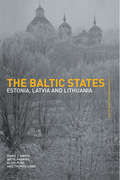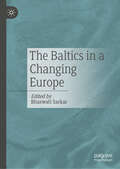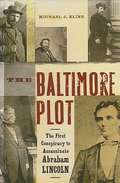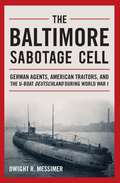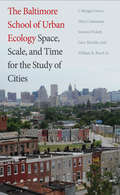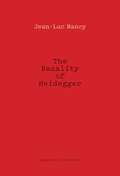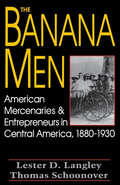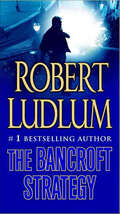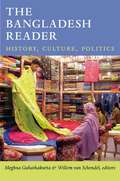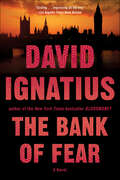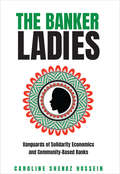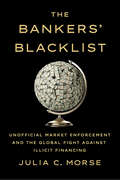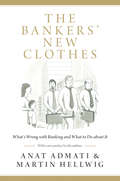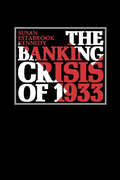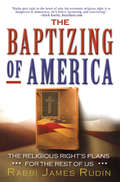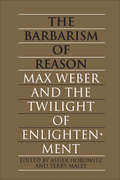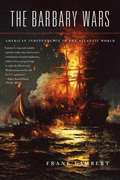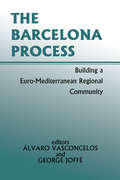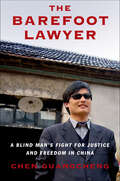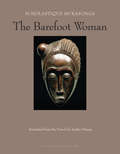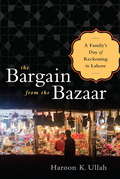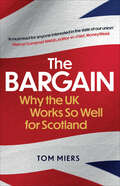- Table View
- List View
The Baltic States: Estonia, Latvia and Lithuania (Postcommunist States and Nations #3)
by David J. Smith Thomas Lane Artis Pabriks Aldis PursSince the end of the Cold War there has been an increased interest in the Baltics. The Baltic States brings together three titles, Estonia, Latvia and Lithuania, to provide a comprehensive and analytical guide integrating history, political science, economic development and contemporary events into one account. Since gaining their independence, each country has developed at its own pace with its own agenda and facing its own obstacles. The authors examine the tensions accompanying a post-communist return to Europe after the long years of separation and how each country has responded to the demands of becoming a modern European state. Estonia was the first of the former Soviet republics to enter membership negotiations with the European Union in 1988 and is a potential candidate for the next round of EU expansion in 2004. Lithuania and Latvia have also expressed their desire for future membership of NATO and the EU.
The Baltics
by Stefania Fabrizio Robert Burgess Yuan XiaoThis paper assesses the competitive position of the Baltic countries of Estonia, Latvia, and Lithuania, in the light of their accession to the EU, focusing on the viability of maintaining fixed exchange rates upon joining the EU, participating in its exchange rate mechanism and adopting the euro currency. Issues discussed include: effective exchange rate indicators and export performance; productivity developments; equilibrium real exchange rates; and policy implications.
The Baltics in a Changing Europe
by Bhaswati SarkarThis edited volume brings together a series of papers on various facets of the three Baltic countries, Estonia, Latvia and Lithuania which have not attracted much intellectual attention outside Europe, especially in South Asia. The countries regained independence in 1991 following the disintegration of the Soviet Union. They sought to secure themselves by joining the EU, NATO and the Eurozone. They are robust democracies registering steady economic growth with improved living standards and are leading hubs in the field of Information Technology. However, for these small states bordering Russia the ongoing Russia-Ukraine war brings existential fears. This volume analyses how these states with substantial number of Russian minorities are recalibrating their policies in this changing geopolitical landscape of an assertive and aggressive Russia. It provides an in-depth understanding of the Baltic countries focusing on their security concerns, regional cooperation, gender and minority issues and bi-lateral relations with emerging powers China and India. The volume would be of immense value to scholars of International Relations, academics, journalists, researchers and policy makers.
The Baltimore Plot: The First Conspiracy to Assassinate Abraham Lincoln
by Michael J. KlineIn January 1861, Abraham Lincoln¿s private train steamed from Illinois to Washington, D.C., where he would be inaugurated as the sixteenth President. However, in Baltimore, a group of Confederate conspirators had formed a plot to assassinate the President-in-waiting when his train made its final stop before Washington. When legendary detective Allan Pinkerton got wind of the plot, he advised Lincoln to remain hidden for the remainder of the journey while he conducted an investigation. However, the case was never brought to trial, leading Lincoln to be ridiculed in the press for cowardice because of which, he vowed never to hide in public again. A promise which, four years later when he sat in full view in the balcony of Ford's Theatre, would cost him his life.
The Baltimore Sabotage Cell
by Dwight R. MessimerBy the summer of 1915, Germany was faced with two related, but somewhat dissimilar problems; how to break the British blockade and how to stop or seriously disrupt the British supply line across the Atlantic. The solution to breaking the blockade was to find a way over it, through it, or under it. Aircraft in those days were too primitive, underpowered, and short range to accomplish the first and Germany lacked the naval strength to force a passage through the blockade. But if a fleet of cargo U-boats could be built that were large enough to carry meaningful loads and had the range to make a round trip between Germany and the United States without having to refuel, the blockade might be successfully broken. Responsibility for implementing this solution rested with a section of German Navy Intelligence known as the Etappendienst. The Germans also lacked the naval strength to effect the solution to the other problem; cutting Britain's supply line to America. The German Navy could not defeat the Royal Navy in a slug-fest and there were not enough U-boats to effectively block Britain's cross-Atlantic sea trade. The answer lay in sabotage--blowing up the munitions factories, the depots, and the ships, and infecting the remounts--horses and mules--with Anthrax and Glanders at the western end of the supply line. Responsibility for carrying out sabotage of all types in the United States rested with a newly established subsection of the German Army Intelligence called the Sektion Politik that sent trained saboteurs to the United States beginning in 1915. German agents, together with American sympathizers, carried out more than fifty successful attacks involving fire and explosion before America's entry into the war on 6 April 1917, in addition to spreading Anthrax and Glanders on the East Coast. Of the two solutions to those problems, sabotage was incompatible with Germany's primary diplomatic goal to keep the United States out of the war, while the other, breaking the blockade with a fleet of cargo U-boats, provided the least danger of bringing the United States into the war. The two solutions were widely dissimilar, but the fact that the cargo U-boat project and the sabotage campaign were run by intelligence agencies--the Etappendienst (Navy) and the Geheimdienst (Army), through the agency of one man--Paul Hilken, in one US city--Baltimore, make them inseparable. Those separate solutions created the dichotomy that produced the U-Boat Deutschland and the Baltimore Sabotage Cell.
The Baltimore School of Urban Ecology
by Steward T. Pickett Mary Cadenasso J. Morgan Grove William R. Burch Laura A. Ogden Gary E. MachlisThe first "urban century" in history has arrived: a majority of the world's population now resides in cities and their surrounding suburbs. Urban expansion marches on, and the planning and design of future cities requires attention to such diverse issues as human migration, public health, economic restructuring, water supply, climate and sea-level change, and much more. This important book draws on two decades of pioneering social and ecological studies in Baltimore to propose a new way to think about cities and their social, political, and ecological complexity that will apply in many different parts of the world. Readers will gain fresh perspectives on how to study, build, and manage cities in innovative and sustainable ways.
The Banality of Heidegger
by Jean-Luc NancyHeidegger and Nazism: Ever since the philosopher’s public involvement in state politics in 1933, his name has necessarily been a part of this unsavory couple. After the publication in 2014 of the private Black Notebooks, it is now unambiguously part of another: Heidegger and anti-Semitism.What do we learn from analyzing the anti-Semitism of these private writings, together with its sources and grounds, not only for Heidegger’s thought, but for the history of the West in which this thought is embedded? Jean-Luc Nancy poses these questions with the depth and rigor we would expect from him. In doing so, he does not go lightly on Heidegger, in whom he finds a philosophical and “historial” anti-Semitism, outlining a clash of “peoples” that must at all costs arrive at “another beginning.” If Heidegger’s uncritical acceptance of prejudices and long-debunked myths about “world Jewry” shares in the “banality” evoked by Hannah Arendt, this does nothing to lessen the charge. Nancy’s purpose, however, is not simply to condemn Heidegger but rather to invite us to think something to which the thinker of being remained blind: anti-Semitism as a self-hatred haunting the history of the West—and of Christianity in its drive toward an auto-foundation that would leave behind its origins in Judaism.
The Banana Men: American Mercenaries & Entrepreneurs in Central America, 1880–1930
by Lester D. Langley Thomas Schoonover“An engaging and fascinating narrative of the entrepreneurs and mercenaries who ‘ravished’ Central America between 1880 and 1930.” —The AmericasAmbitious entrepreneurs, isthmian politicians, and mercenaries who dramatically altered Central America’s political culture, economies, and even its traditional social values populate this lively story of a generation of North and Central Americans and their roles in the transformation of Central America from the late nineteenth century until the onset of the Depression. The Banana Men is a study of modernization, its benefits, and its often frightful costs.The colorful characters in this study are fascinating, if not always admirable. Sam “the Banana Man” Zemurray, a Bessarabian Jewish immigrant, made a fortune in Honduran bananas after he got into the business of “revolutin,” and his exploits are now legendary. His hired mercenary Lee Christmas, a bellicose Mississippian, made a reputation in Honduras as a man who could use a weapon. The supporting cast includes Minor Keith, a railroad builder and banana baron; Manuel Bonilla, the Honduran whose cause Zemurray subsidized; and Jose Santos Zelaya, who ruled Nicaragua from 1893 to 1910.The political and social turmoil of modern Central America cannot be understood without reference to the fifty-year epoch in which the United States imposed its political and economic influence on vulnerable Central American societies. The predicament of Central Americans today, as isthmian peoples know, is rooted in their past, and North Americans have had a great deal to do with the shaping of their history, for better or worse.“Recounts incredible stories within the framework of social imperialism and dependency theory.” —Latin American Research Review
The Bancroft Strategy: A Novel
by Robert LudlumIn this international thriller, a rogue agent and a beautiful hedge fund analyst discover a sinister conspiracy hiding behind a benevolent foundation.As a field agent for Consular Operations, Tod Belknap has always had a cowboy reputation. But now, after an operation goes wrong, he has finally been cut loose from the organization. Soon afterward, his best friend and former partner is abducted by a militia group in Lebanon. When the government refuses to get involved, Belknap takes matters into his own hands.Meanwhile, hedge fund analyst Andrea Bancroft is surprised to be offered a seat on her estranged family’s powerful foundation. But the foundation appears less and less benign the more deeply involved she gets. Then she discovers something truly shocking: the foundation is linked to “Genesis”, a mysterious group working to destabilize geopolitical order.As events escalate, Todd Belknap and Andrea Bancroft come together and must form an uneasy alliance if they are to uncover the truth behind “Genesis”—before it is too late.
The Bangladesh Reader: History, Culture, Politics
by Guhathakurta Meghna Van Schendel WillemBangladesh is the world's eighth most populous country. It has more inhabitants than either Russia or Japan, and its national language, Bengali, ranks sixth in the world in terms of native speakers. Founded in 1971, Bangladesh is a relatively young nation, but the Bengal Delta region has been a major part of international life for more than 2,000 years, whether as an important location for trade or through its influence on Buddhist, Hindu, and Muslim life. Yet the country rarely figures in global affairs or media, except in stories about floods, poverty, or political turmoil. The Bangladesh Reader does what those portrayals do not: It illuminates the rich historical, cultural, and political permutations that have created contemporary Bangladesh, and it conveys a sense of the aspirations and daily lives of Bangladeshis. Intended for travelers, students, and scholars, the Reader encompasses first-person accounts, short stories, historical documents, speeches, treaties, essays, poems, songs, photographs, cartoons, paintings, posters, advertisements, maps, and a recipe. Classic selections familiar to many Bangladeshis--and essential reading for those who want to know the country--are juxtaposed with less-known pieces. The selections are translated from a dozen languages; many have not been available in English until now. Featuring eighty-three images, including seventeen in color, The Bangladesh Reader is an unprecedented, comprehensive introduction to the South Asian country's turbulent past and dynamic present.
The Bank of Fear: A Novel
by David Ignatius"Sizzling…engrossing all the way." —Los Angeles Times Book ReviewHit men stalk computer analyst Lina Alwen and financial investigator Sam Hoffman in pursuit of the knowledge the pair may have regarding a late Iraqi dictator’s billions. From London to Switzerland, and from Baghdad to the mysterious corners of the just-budding Internet, this spy thriller covers the map to uncover a world of corruption.
The Banker Ladies: Vanguards of Solidarity Economics and Community-Based Banks
by Caroline Shenaz HosseinAll over the world, Black and racialized women engage in the solidarity economy through what is known as mutual aid financing. Formally referred to as rotating savings and credit associations (ROSCAs), these institutions are purposefully informal to support the women’s livelihoods and social needs, and they act to reject tiered forms of neo-liberal development. The Banker Ladies – a term coined by women in the Black diaspora – are individuals that voluntarily organize ROSCAs for self-sufficiency and are intentional in their politicized economic co-operation to counter business exclusion. Caroline Shenaz Hossein reveals how Black women redefine the banking co-operative sector to be inclusive of informal institutions that are democratic and focused on group consensus, and which build an activist form of economic co-operation that is intent on making social profitability the norm. The book examines the ways in which diasporic Black women, who organize mutual aid, receive little to no attention. Unapologetically biased towards a group of women who have been purposely sidelined and put down for what they do, The Banker Ladies highlights how, in order to educate oneself about their contributions to politics and economics, it is imperative to listen to the voices of hundreds of Black women in charge of financial services for their communities.
The Bankers' Blacklist: Unofficial Market Enforcement and the Global Fight against Illicit Financing (Cornell Studies in Money)
by Julia C. MorseIn The Banker's Blacklist, Julia C. Morse demonstrates how the Financial Action Task Force (FATF) has enlisted global banks in the effort to keep "bad money" out of the financial system, in the process drastically altering the domestic policy landscape and transforming banking worldwide.Trillions of dollars flow across borders through the banking system every day. While bank-to-bank transfers facilitate trade and investment, they also provide opportunities for criminals and terrorists to move money around the globe. To address this vulnerability, large economies work together through an international standard-setting body, the FATF, to shift laws and regulations on combating illicit financial flows. Morse examines how this international organization has achieved such impact, arguing that it relies on the power of unofficial market enforcement—a process whereby market actors punish countries that fail to meet international standards. The FATF produces a public noncomplier list, which banks around the world use to shift resources and services away from listed countries. As banks restrict cross-border lending, the domestic banking sector in listed countries advocates strongly for new laws and regulations, ultimately leading to deep and significant compliance improvements.The Bankers' Blacklist offers lessons about the peril and power of globalized finance, revealing new insights into how some of today's most pressing international cooperation challenges might be addressed.
The Bankers' New Clothes: What's Wrong with Banking and What to Do about It - Updated Edition
by Anat Admati Martin HellwigWhy our banking system is broken—and what we must do to fix itAs memories of the Global Financial Crisis have faded, it has been tempting to believe that the banking system is now safe and that we will never again have to choose between havoc and massive bailouts. But The Bankers’ New Clothes shows that reforms have changed little—and that the banks still present serious dangers to the world economy. Writing in clear language anyone can understand, Anat Admati and Martin Hellwig explain how we can have a healthier banking system without sacrificing any benefits. They also debunk the false and misleading narratives of bankers, regulators, politicians, academics, and others who oppose real reform.
The Banking Crisis of 1933
by Susan Estabrook KennedyA “well-written, carefully researched study” of this dramatic episode in American financial history, when the banking industry verged on complete collapse (Business History Review).On March 6, 1933, Franklin D. Roosevelt, less than forty-eight hours after becoming president, ordered the suspension of all banking facilities in the United States. How the nation had reached such a desperate situation and how it responded to the banking “holiday” are examined in this book, the first full-length study of the crisis.Although the 1920s had witnessed a wave of bank failures, the situation worsened after the 1929 stock market crash, and by the winter of 1932-1933, complete banking collapse threatened much of the nation. President Hoover’s stopgap measures proved totally inadequate, the author shows, and by March 4, the day of Roosevelt’s inauguration, thirty-four states had declared banking moratoriums. Of special interest in this study is the author’s examination of relations between Herbert Hoover and Franklin D. Roosevelt. Upon the book’s publication, Reviews in American History described The Banking Crisis of 1933 as “by far the best and most comprehensive [study] that has appeared,” and praised its “clear and readable style.”
The Baptizing of America: The Religious Right's Plans for the Rest of Us
by Rabbi James RudinHere, at last, are the war plans of America's own religious extremists. The Baptizing of America exposes the systematic campaign by Christian fundamentalists to co-opt and take over every "room" of American society from the bedroom to the school room, hospital room, operating room, courtroom, work room, reading room and newsroom. This book focuses on the aggressive and well-funded war currently being led by fundamentalist Christians to "baptize America." It is a prolonged battle that will determine whether the United States remains a spiritually vital country - but one without an officially established religion - or whether it will become "Christianized," a "faith-based nation" in which fundamentalist Christianity will be the sole legal dominant religion throughout the land. The war will decide whether America follows the path of many other nations and becomes a theocracy, not unlike Iran and the former Taliban regime in Afghanistan.
The Barack Obama Presidency
by John DavisExploring the 'promise' and 'peril' associated with the opening two years of the presidency of Barack Obama, this book is a comparative look at the various aspects of his presidential strategy including the impact of his legislative agenda, his use of executive power, and the burgeoning disillusionment within the African American community.
The Barbarism of Reason: Max Weber and the Twilight of Enlightenment
by Terry Maley Asher HorowitzThe recent renewal of interest in Max Weber evidences an attempt to enlist his thought in the service of a renewed dream of Enlightenment individualism. Yet he was the first twentieth-century thinker to fully appreciate the pervasiveness and ambiguity of rationalization which threatened to undermine the hopes of the Enlightenment. Asher Horowitz and Terry Maley present a collection of essays tracing the contemporary significance of Weber's work for the tradition of Enlightenment political thought and its critiques. In its critical inquiry into Weber's thought, The Barbarism of Reason continues the exploration of the limits and prospects of politics in a rationalizing society. The first section comprises a set of both historical and philosophical reflections on the political implications of Weber's central concepts such as disenchantment, rationality, and affectivity, the historical understanding, meaning, and domination. The second section examines the institutional and historical context that framed Weber's inquiries into structures of the modern mode of domination, as well as his understanding of the nature of the modern state. Among the topics broached are Weber's strategic intervention into the development of the liberal theory of the state as well as a critical examination of the theoretical and pre-theoretical roots of his construction of the subject. Another of the essays reveals the schizophrenic structure of modern subjectivity. The third and last section attempts to trace the vicissitudes of Weber's seminal problems concerning rationalization, power, and disenchantment through some of the most important responses to his work in the twentieth century.
The Barbarization of Warfare
by George KassimerisThe images from Abu Ghraib prison in Baghdad have been a grim reminder of warfare's undiminished capacity for brutality and indiscriminate excess. What happened in Abu Ghraib has happened before: the World War II, and more recent wars and insurgencies in Algeria, Congo, Angola, Vietnam, Bosnia, Kosovo, Chechnya, and many others, all bear witness to the ever-present human capacity to commit barbaric acts if circumstances allow.What drives people to mistreat, humiliate, and torment others? In an age when real time war, violence, and torture are becoming addictive forms of entertainment, it is now more critical than ever to deepen our understanding of the extraordinary distortions of the human psyche and spirit that occur in wartime. Eight distinguished scholars explore, in this first collective effort, the effects of the barbarization of warfare on our cultures and societies.Contributors: Joanna Bourke, Niall Ferguson, Jay Winter, Richard Overy, David Anderson, Hew Strachan, Paul Rogers, Kathleen Taylor, Marilyn Young, Paul Rogers, Anthony Dworkin, Amir Weiner, Mary Habeck, and David Simpson.
The Barbary Wars: American Independence in the Atlantic World
by Frank Lambert(back of book) The history of Americas conflict with the piratical states of the Mediterranean runs through the presidencies of Washington. Adams. Jefferson, and Madison; the adoption of the Constitution: the Quasi-War with France and the War of 1812: the construction of the Constitution: the Quasi-War with France and the War of 1812; the construction of a full-time professional navy: and, most important, the nation's halting steps toward commercial independence. Frank Lambert's genius is to see in the Barbary Wars the ideal means of capturing the new nation's shaky emergence in the complex context of the Atlantic world. Depicting a time when Britain ruled the seas and France most of Europe, The Barbary Wars proves that America's earliest conflict with the Arab world was always a struggle for
The Barcelona Process: Building a Euro-Mediterranean Regional Community
by George Joffé Álvaro VasconcelosThe Euro-Mediterranean Partnership - the Barcelona Process - aims to create integration in the Mediterranean Basin so as to encourage economic development along the Southern rim. This volume takes a critical look at the problems faced by the Process and the likelihood of its success.
The Barefoot Lawyer: A Blind Man's Fight for Justice and Freedom in China
by Chen GuangchengAn electrifying memoir by the blind Chinese activist who inspired millions with the story of his fight for justice and his belief in the cause of freedomIt was like a scene out of a thriller: one morning in April 2012, China's most famous political activist—a blind, self-taught lawyer—climbed over the wall of his heavily guarded home and escaped. Days later, he turned up at the American embassy in Beijing, and only a furious round of high-level negotiations made it possible for him to leave China and begin a new life in the United States.Chen Guangcheng is a unique figure on the world stage, but his story is even more remarkable than anyone knew. The son of a poor farmer in rural China, blinded by illness when he was an infant, Chen was fortunate to survive a difficult childhood. But despite his disability, he was determined to educate himself and fight for the rights of his country's poor, especially a legion of women who had endured forced sterilizations and abortions under the hated "one child" policy. Repeatedly harassed, beaten, and imprisoned by Chinese authorities, Chen was ultimately placed under house arrest. After nearly two years of increasing danger, he evaded his captors and fled to freedom.Both a riveting memoir and a revealing portrait of modern China, The Barefoot Lawyer tells the story of a man who has never accepted limits and always believed in the power of the human spirit to overcome any obstacle.
The Barefoot Woman
by Scholastique MukasongaA moving, unforgettable tribute to a Tutsi woman who did everything to protect her children from the Rwandan genocide, by the daughter who refuses to let her family's story be forgotten.The story of the author's mother, a fierce, loving woman who for years protected her family from the violence encroaching upon them in pre-genocide Rwanda. Recording her memories of their life together in spare, wrenching prose, Mukasonga preserves her mother's voice in a haunting work of art.
The Bargain from the Bazaar: A Family's Day of Reckoning in Lahore
by Haroon K. UllahAwais Reza is a shopkeeper in Lahore's Anarkali Bazaar-the largest open market in South Asia-whose labyrinthine streets teem with shoppers, rickshaws, and cacophonous music.But Anarkali's exuberant hubbub cannot conceal the fact that Pakistan is a country at the edge of a precipice. In recent years, the easy sociability that had once made up this vibrant community has been replaced with doubt and fear. Old-timers like Awais, who inherited his shop from his father and hopes one day to pass it on to his son, are being shouldered aside by easy money, discount stores, heroin peddlers, and the tyranny of fundamentalists.Every night before Awais goes to bed, he plugs in his cell phone and hopes. He hopes that the city will not be plunged into a blackout, that the night will remain calm, that the following morning will bring affluent and happy customers to his shop and, most of all, that his three sons will safely return home. Each of the boys, though, has a very different vision of their, and Pakistan's, future.The Bargain from the Bazaar-the product of eight years of field research-is an intimate window onto ordinary middle-class lives caught in the maelstrom of a nation falling to pieces. It's an absolutely compelling portrait of a family at risk-from a violently changing world on the outside and a growing terror from within.
The Bargain: Why the UK Works So Well for Scotland
by Tom MiersThree hundred years ago, Scotland struck an extraordinary bargain with its English neighbour. Like all the best deals it involved giving away little – nominal sovereignty – in exchange for major gains: economic, political and cultural. Control over key domestic matters was retained. Today, that bargain, updated for the democratic era, is better than ever. Nonetheless, a Scottish nationalist campaign of remarkable discipline has brought the United Kingdom to the point of extinction. This book sets out how to save it. It offers new political ideas and a clear set of rules to govern the constitutional debate. But above all, it urges those who wish to save the Union to explain that the bargain is not just a matter of money, or even sentiment about a shared past, but a canny and sophisticated arrangement that benefits all nations of the UK. It is the foundation of Scotland’s success and unique place in the world.
